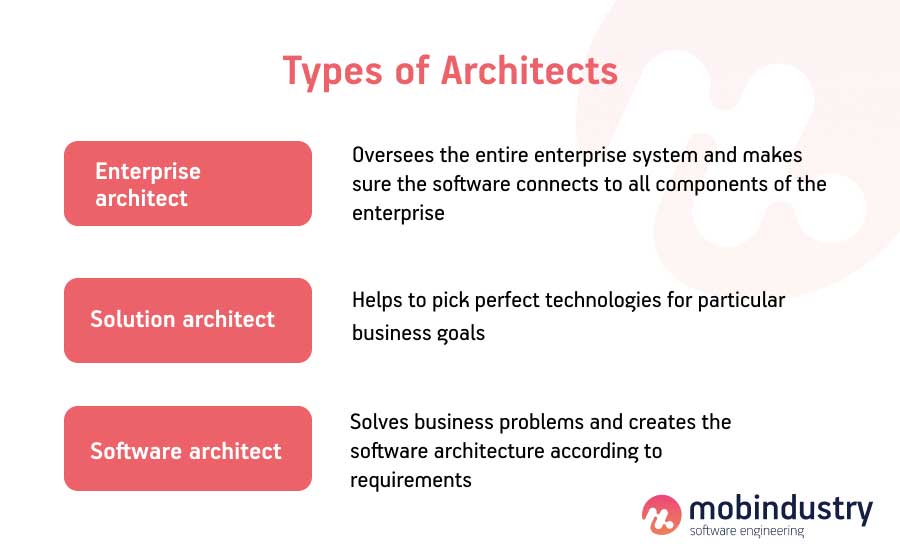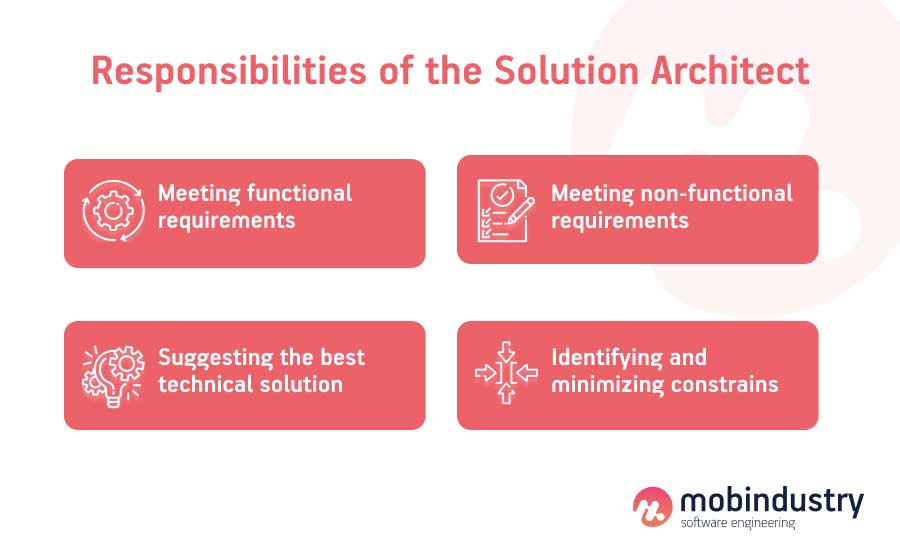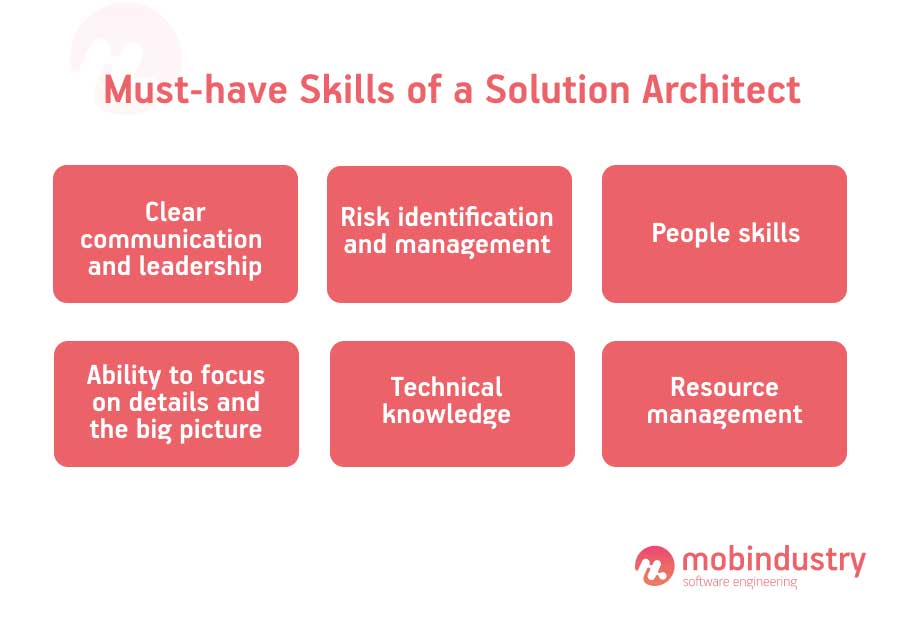When You Need a Solution Architect for your Digital Project
Solution architect is a relatively new role in software development that appeared as a response to project issues that come with the ever-increasing complexity of the development process. Learn how a solution architect can help you deliver your project on time and on budget and work to the benefit of your business
The hard reality of modern software development is that most projects fail or are challenged at best. Although the software development culture is already mature enough so average developers can deliver a project on time and within budget, projects still fall flat because they fail to meet business needs.
Who is at fault here, and how can we prevent situations where a product is released that misses the business needs or where the business needs change during the development process? A solution architect helps minimize these risks.
Who is a solution architect?
Who is a solution architect, and how are solution architects different from project managers, business analysts, and team leads?
A solution architect is a person who’s well versed in both business and technology. This specialist often has an extensive background in software development, so they can communicate with developers using technical language. But they also have training and experience in business development. Basically, a solution architect is a person who’s able to pick the right technology for the right product.
Apart from picking the right technologies, a solution architect also works as a bridge between developers, business analysts and stakeholders
Usually, the link between business needs and technologies is established by both the business analyst, who specifies the features, and the tech team lead, who suggests the tech stack for the project. However, a tech lead might be too focused on technology to know exactly what a business needs, and this shows in large high-risk projects that take a long time to be developed and need to be relevant for the business once they’re released.
What do solution architects do? Apart from picking the right technologies, a solution architect also defines the main stages of the development process and suggests the best architectural patterns. Because they’re responsible for the technologies, solution architects also know what the optimal development team should look like: for example, how many developers and other specialists the project requires and what specific skills they need.

This deep understanding allows solution architects to also accurately estimate the time and cost of a project, and in the development process they’re responsible for staying within time and resource constraints.
If solution architects are responsible for following the timeline and budget, how are they different from project managers?
Project managers oversee the development process and are focused on small details: making sure deadlines are met, monitoring tasks, communicating with stakeholders in the software development process. Solution architects, on the other hand, have a helicopter view of the project and play the role of project leaders rather than managers.
Types of architects
There are three types of architects in software development, and though they’re similar, there are significant differences.
- Enterprise architect — oversees the entire enterprise system and makes sure the software connects to all components of the enterprise
- Solution architect — helps to pick perfect technologies for particular business goals
- Software architect — solves business problems and creates the software architecture according to requirements
A solution architect is basically the intermediary between enterprise and software architects, as they define which technologies will best suit the needs of the global enterprise infrastructure.
Let’s now talk in detail about the enterprise solution architect roles and responsibilities. They can vary depending on the project, so I’ll list the most common in this article.
Role of a solution architect in software development
The main role of a solution architect is to pick a technology stack that reflects the needs of the business and the interests of all stakeholders. This role is complex, as a solution architect must not only consider business requirements but also the company’s capabilities, budget, and deadline.
What does a solutions architect do and how do they fulfill their role? For example, say a logistics company wants to build software so customers can manage their parcels, track delivery, and so on.
First, business analysts extract the business requirements and turn them into:
- Functional requirements
- Non-functional requirements
- Constraints (any legal issues like compliance with the GDPR, for example)
Then the solution architect decides on a platform (web app, website, mobile, or all at once) and technologies. For example, for mobile apps, your solution architect may suggest either native or cross-platform technologies.
After that, the solution architect assembles the team and assigns roles and responsibilities to all team members.
Responsibilities of the solution architect
Let’s discuss the main responsibilities of the solution architect, and the solution architecture best practices.
Meeting functional requirements
After the business analyst defines the features and functionality requirements for a project, the solution architect’s responsibility is to translate them into concrete technical solutions and present them to the technical team.
In this case, the solution architect plays the role of a bridge between the business analyst and the engineering team, as they’re able to speak tech while keeping business aspects in mind.
Meeting non-functional requirements
Non-functional requirements describe software behavior and peculiarities that have nothing to do with functionality. Here are some examples of non-functional requirements:
- Language
- Security
- Maintainability
- Scalability
- Reliability
- Performance
- Usability
There are many more requirements that are extremely important for software to be efficient and helpful. A solution architect needs to make sure that software is easy for businesses to use, integrate, and maintain.
Suggesting the best technical solution
The tech stack for software includes a framework, server architecture, databases, libraries, third-party integrations, APIs, testing tools, and other components.
There are currently hundreds of solutions on the market, and a solution architect should know what works best for particular goals. It’s also important that all components work well together.
Identifying and minimizing constraints
Constraints in software development include:
- Time
- Money
- Licencing
- Risks
- Technical or team limitations
A solution architect should keep these constraints in mind when designing software, suggesting technical solutions, and picking a team. For example, if a solution architect chooses a great but not a really popular technology, they risk losing a rare specialist that will be hard to replace.

Other possible responsibilities of a solution architect include:
- Offering different options for architectural patterns and solutions
- Upholding the development standards
- Solving technical problems
- Making sure resources are sufficient for the task
- Estimating the budget and time required for development
- Identifying and minimizing risks
- Communicating with stakeholders
- Coordinating the team
- Managing infrastructure costs
- Ensuring code quality
- Helping team members acquire new competencies and skills if needed
As you can see, a solution architect has to be well versed in multiple areas of software development and have extensive experience in developing products with different technologies and for various industries. Let’s talk about other experiences and qualities a good solution architect should have.
What makes a good solution architect: skills and experience

Both soft and hard skills are essential for a solution architect, as they not only work with technologies but also communicate a lot with stakeholders and team members. Here are the top solution architect skills.
Clear communication and leadership. A solution architect needs to communicate with all kinds of specialists, from project managers and business analysts to developers and stakeholders. They need the ability to speak with engineers using technical terms and also to clearly explain complex technical concepts to stakeholders.
Because a solution architect is also a leader of the development process, they need to have soft skills to interact with team members, lead them, and negotiate with them.
Risk identification and management. Many risks can emerge during the development process, and a skilled solution architect needs the ability to predict and minimize them. Risk management and identification comes with experience working on different projects.
People skills. A solution architect needs to gain trust and credibility among several groups of people including engineers, stakeholders, and other specialists. For them to trust their guidance, a solution architect must have confidence and be able to assign the right people to the right jobs.
Resource management. All software development projects have limited resources. A solution architect needs to consider the budget, deadlines, available team members, and available tools.
Ability to focus on both details and the big picture. While a solution architect is a planner who oversees the whole development process, they also need the ability to focus on details. This is especially important in meeting the initial requirements. In large projects, it’s easy to get overwhelmed by small details and multiple processes that happen simultaneously.
Technical knowledge. The solution architect technical skills should include the knowledge of all technologies that are currently popular on the market and what their purposes and peculiarities are. It’s important that they know all the ins and outs of the development process. Often, solution architects are former engineers that have gained business experience.
A solution architect must possess knowledge in:
- Operating systems
- Infrastructure design
- Architectural patterns
- Security best practices
- DevOps
- Database management
- Web platforms
- Cloud computing and development
- Software and hardware management
- Project and product management
- Business analysis
- Network management
As you can see, a solution architect is one of the most skilled professionals you can possibly have on your team, and such a specialist isn’t cheap. Let’s find out whether you need a solution architect on your development team and what businesses and projects will benefit most from a solution architect.
Do you need a solution architect on your project?
Not every software development project needs a solution architect. Usually, solution architects are hired after damage has been done and the technologies in the project are no longer serving the business goals. Then, the business hires a solution architect to do an audit and give recommendations on how to fix the issues that have emerged.
In this case, a solution architect can play the role of an IT consultant who suggests technologies and changes. They can help to organize the new software development process, but they don’t necessarily take part in it. However, if you feel that the team has lost track of the project and doesn’t know what the next steps should be, it’s best to hire a full-time solution architect to get things in order.
Solution architects are usually most useful in large, long-term projects for enterprises, where the investments are as high as the risks.
Small and midsized companies that create their own software usually distribute the technical solution architect roles and responsibilities among other specialists. For example, a team lead developer chooses the technology stack, a business analyst defines the features and performs competitor and market research, and a UI/UX designer analyzes the target audience and works on the user experience.
However, when your project grows and becomes more complex, it can be hard to determine at which point it’s best to hire a solution architect before it’s too late. Let’s once again list all possible situations in which you should start thinking about hiring a solution architect for your team.
You need to integrate new software into your existing system. Integrating new software with existing systems is always a challenge because of compatibility and integration issues. This is especially true with a legacy system built with outdated technologies that has lots of spaghetti code that hasn’t been properly reviewed in a long time.
A solution architect in this case not only helps you pick optimal technologies for a new software component but also audits the older system and makes sure new software will work properly. A solution architect will also help you build a transition plan if you intend to eventually move from your old system to a new one. This plan will allow you to make the shift as effectively as possible without disturbing your business operations.
You need a clear plan for product development. Say you want to build a mobile application for your enterprise. You have the ability to hire a development team, but your company doesn’t have a person with relevant experience that would be able to lead the process and reflect your business goals in the product. This is when you need a solution architect.
A solution architect will be able to build a roadmap for your team so they have a clear development plan.
This is also useful if you’re planning to present your vision to investors. Having a clear plan with a list of technologies and development steps is always more influential than having a mere idea.
You’re planning to build a large-scale product. Large products require heavy investment and are a huge responsibility. It’s a wise decision to hire a solution architect early to make sure your product:
- Is valuable on the market
- Fulfills business goals
- Is delivered on time and within budget
Large projects bear lots of risks, and it’s always best to prevent issues now rather than fix them later. A solution architect will be able to predict technical and business risks and make sure your product doesn’t turn into an inflexible technical monster that’s hard to change, maintain, and expand.
Final thoughts
In this article, you’ve learned about the role of a solution architect in a software development project. Although not all projects require a solution architect’s extensive expertise, if you’re planning to build a large-scale product, my advice is to hire a solution architect early. It’s always more economical Саto prevent issues rather than to resolve them.
The main goal of a solution architect is to organize the development process so that the final product is delivered according to your business needs and requirements.
A solution architect should be experienced in both the business and technical aspects of software product development and should have strong communication skills, as this role requires leadership and communication with both software developers and stakeholders.
If you’re planning to involve a solution architect into your existing product development, or if you would like to hire a solution architect for your new software development project, make sure to contact us. At Mobindustry, we have specialists with over 10 years of experience in business-oriented software development, and we provide full-cycle development as well as IT consulting services.
Frequently Asked Questions
The responsibilities of a solution architect include:
- Meeting functional requirements
- Meeting non-functional requirements
- Suggesting the best technical solution
- Identifying and minimizing constraints
- Offering different options for architectural patterns and solutions
- Upholding the development standards
- Solving technical problems
- Making sure resources are sufficient for the task
- Estimating the budget and time required for development
- Identifying and minimizing risks
- Communicating with stakeholders
- Coordinating the team
- Managing infrastructure costs
- Ensuring code quality
- Helping team members acquire new competencies and skills if needed
You need a solution architect on your project if:
- You need to integrate new software into your existing system
- You need a clear plan for product development
- You’re planning to build a large-scale product
Large projects bear lots of risks, and it’s always best to prevent issues now rather than fix them later. A solution architect will be able to predict technical and business risks and make sure your product doesn’t turn into an inflexible technical monster that’s hard to change, maintain, and expand.


